





















|
My look at life on the
klongs
by Lesley Warner
An early morning phone call had my friend and I
travelling through appalling traffic jams to Nonthaburi (Bangkok) at the
weekend, as a member of the family had decided to move back to Buriram. I
asked why such a sudden decision and found out that apparently a fight over
one of the children had involved two ladies, a large stick of wood and the
police, thus resulting in the decision to move by one of the families.
 The
house that stayed The
house that stayed
You might well ask how that involved us; well apparently,
if you move you take the house with you, as wood is expensive, so it’s all
hands to help. Half a dozen members of the family had come down from Buriram
with a lorry and by the time we got there I thought it was nearly over, but
I was wrong. Every last piece of wood down to the last nail is removed.
As they removed the planks of wood that were the floor I
was amazed at the amount of rubbish under the house, and I mean years of
rubbish, like tin cans, plastic bottles, plastic bags, sweet wrappers,
everything. I suppose it’s literally ‘out of sight out of mind’.
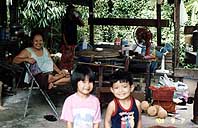 A
place to cook, eat, sit and work - what more could you want? A
place to cook, eat, sit and work - what more could you want?
Keeping well out of the way, I sat with the ladies and
watched them prepare the Kao Sad. This is a Thai sweet traditionally
prepared by ‘Issan’ ladies at the time of Ork Pan Saa, celebrated on 2nd
November. At this time monks can leave the Wat (temple) if they no longer
want to be a monk, regardless of how long their term has been. They give Kao
Sad to the temple and to each other. To exchange this sweet is to offer good
luck to neighbours and friends for the rest of the year.
 Moving
house Moving
house
The coconut is grated while sitting on a low wooden
stall, on the end is a small round saw that is used to remove the meat from
the coconut shell. Then water is poured onto the coconut meat, mixed and
squeezed out, the coconut meat is thrown away and the liquid that is left
(looks like cows milk) is put on a flame to simmer for approximately 5
hours. The water and coconut mixture separates, keeping only the coconut
mixture. They leave it to go cold and then add sugar and rice still in the
husk. This is heated up again until the finished product ends up looking a
bit like popcorn.
 Are
you sure you wouldn’t like to try some gin mak? Are
you sure you wouldn’t like to try some gin mak?
The family also have a small business at the house making
resin Buddhas that they then take around to shops in Bangkok and sell.
It’s well set up with a generator, all the moulds for different sizes,
paint sprays and various other tools. Each person in the family appears to
have their own role in the production of these Buddhas. They pour the resin
into the moulds, clean when set, paint, stick on the clothes and gold
adornments, and then take them to the shops to sell. They work at a very
leisurely pace, but the work seems to get done.
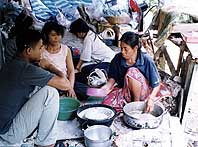 Preparing
the kao sad Preparing
the kao sad
As I watched the ladies working and listened to the men
laughing and dismantling the house, I lay on the wooden terrace of the house
overhanging the small klong. My friend’s mother and her sister were
desperately trying to communicate with me but with a mouth full of gin mak
and the Buriram dialect we were on a loser from the word go. In the end they
gave up in fits of laughter and concentrated on watching me write my story
with fascination.
The vendors were up and down the small klong selling
their barbecued chickens and fruit and I was told occasionally there are
boats with Farang tourists that come to observe this fascinating way of
life. I thought how lucky I am; I actually get the chance to witness this
very different culture from the inside.
And the Alps came to
Pattaya
by Miss Terry Diner
Billed as an evening where East meets West, the
‘dynamic duo’ of Pascal Schnyder and Dominic Barth, two Korean orphans
raised in Switzerland (how much East meets West do you want?) brought an
Alphorn quartet from St. Moritz to produce an amazing event at Casa Pascal
last weekend.
 Pascal
Schnyder and his wife Kim (center), Dominic Barth (4th left) and the Casa
Pascal staff enjoy a moment with the Alphorn quartet from St. Moritz. Pascal
Schnyder and his wife Kim (center), Dominic Barth (4th left) and the Casa
Pascal staff enjoy a moment with the Alphorn quartet from St. Moritz.
The guests were met at the door by the four black hatted
alphorn blowers, under the leadership of Dr. Hans Peter Danuser, the
director of the St. Moritz Tourist Board, ably assisted by Rudolph J.
Birchler, the chief of the St. Moritz police, Urs Bruetsch, the airport
controller and hotel entrepreneur Rudolf Tschander-Derungs, another large
Swiss gentleman who obviously enjoys his food as well as horn blowing.
Quietly observing was the lord mayor of St. Moritz, Peter Barth, who just
happens to be Dominic Barth’s father! East certainly did meet West!
 The
lord mayor of St. Moritz, Peter Barth, who just happens to be Dominic
Barth’s father! The
lord mayor of St. Moritz, Peter Barth, who just happens to be Dominic
Barth’s father!
The musical skills of the alphorn players were
demonstrated during the dinner, and the guests even had a chance to try
their skills, with some mixed results. Pieces such as excerpts from
Beethoven’s 6th symphony and even ‘Amazing Grace’ not being out of the
range of the unwieldy instruments.
Dr. Hans brought up the fact that although the alphorns
were still made in Switzerland from traditional pinewood, the strapping
around the length of the horn was these days made from Thai bamboo. East
meets West again.
 (L
to R) Urs Bruetsch, Hans Peter Danuser, Rudolf Tschander-Derungs and Rudolph
J. Birchler of the Alphorn quartet from St. Moritz. (L
to R) Urs Bruetsch, Hans Peter Danuser, Rudolf Tschander-Derungs and Rudolph
J. Birchler of the Alphorn quartet from St. Moritz.
The menu produced by chef Pascal was another innovative
East meets West triumph with such offerings as a pumpkin soup with tom yam
shrimp and lotus chips, which was a stunning combination, or the lemon sole
fillet, crusted with macadamia in a lemongrass butter sauce, also superb.
Pascal, Dominic and Kim are to be congratulated on
bringing some world class western style culture to the gourmands of Pattaya.
As East meets West, the face of Pattaya is slowly changing. And for the
better.
Bruno’s Restaurant
celebrated its birthday in style
by Miss Terry Diner
Bruno’s Restaurant partners Bruno Forrer and Fredi
Schaub were on hand to welcome the customers to their 5th anniversary dinner
on Sunday night, September 30. Most of the regulars were there but
unfortunately many others had to be turned away at the door as the event was
booked out one week prior to the special anniversary dinner.
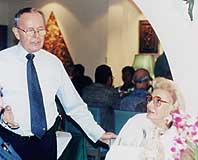 The
consummate host, Bruno always greets his guests - here he has a chat with
Mrs North of Polaris Water fame. The
consummate host, Bruno always greets his guests - here he has a chat with
Mrs North of Polaris Water fame.
Bruno spoke on the beginnings of the restaurant project,
when he and his lifetime friend the late Louis Fassbind (AKA Mr. Pattaya),
took over the restaurant previously run by the late Dolf Riks, describing it
as a bit of a shotgun marriage! After a couple of years, master chef Fredi
Schaub joined with Bruno and the current team have built up a restaurant
which is accepted as the “Gold Standard” in Pattaya dining.
With the dinner being a sell out, there were too many
people there to mention them all, but one who stood out, resplendent in a
Nehru jacket, was Doug Rosario. Also enjoying the special menu were Alice
and Niel Poulsen, relaxing after the hard work of the Jesters Charity Fair.
Other bon vivants and raconteurs par excellence who were present were the
Shenanigans landlord, Kim Fletcher and the irrepressible Louis from Mata
Hari.
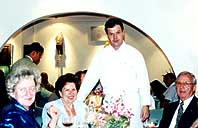 Fredi
takes a breather from the kitchen to say hello to Dorli Piller and Eric
Dietl during the restaurant’s 5th anniversary dinner. Fredi
takes a breather from the kitchen to say hello to Dorli Piller and Eric
Dietl during the restaurant’s 5th anniversary dinner.
The special 555 baht menu from the creative kitchen of
Fredi commenced with a rose of smoked salmon with a wonderfully tangy white
wine flavoured sour cream sauce with dill and shallots. This was followed by
a ratatouille cream soup with the most wonderful garlic croutons and a baked
strudel with chicken, leek and soya sprouts in two sauces. If that was not
enough Bruno and Fredi then offered a beef and veal roulade in a red wine
sauce, surrounded most decoratively with mashed potatoes in swirls.
Definitely the dish of the evening for Miss Terry. Of course there was a
dessert, a creme brule in an almond basket, which was a fitting end to a
sumptuous banquet.
Thank you Bruno and Fredi, and we look forward to
celebrating your 6th anniversary next year. To avoid disappointment, it
might be advisable to book now!
Shenanigans 1st birthday
 Shenanigans
staff - always ready to show you a good time, were in their element at the
1st anniversary party. Shenanigans
staff - always ready to show you a good time, were in their element at the
1st anniversary party.
While the Shenanigans Pub building has been around for a
while, and the landlord Kim Fletcher has definitely been around for a long
while, the pub itself has only been called Shenanigans for 12 months. To
celebrate the event with Kim, the regulars (and some happy visitors) popped
in to listen to The Zone (the new house band) and partake of a few ales.
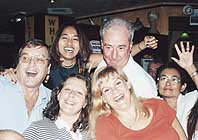 Shenanigans
sure know how to throw a party, as evidenced by this fun crew Shenanigans
sure know how to throw a party, as evidenced by this fun crew
At the “birthday” Kim advised everyone of the
forthcoming “Seventies Night” this Saturday 6th October, so all of the
baby boomers are expected to appear in their best 70’s clobber. Another
fun night at Shenanigans, and another thick head on Sunday morning!
Happy birthday Shenanigans!
Worldwide Caution from
US Embassy
This message is for all American wardens and US citizens
in Thailand. Wardens, please distribute the message to all Americans in your
organization.
Public Announcement
U.S. Department Of State
Office of the Spokesman
Worldwide Caution
September 28, 2001
The U.S. Government remains deeply concerned about the
security of Americans overseas. Following the attacks on September 11, we
have continuing concern based on threatening rhetoric from extremist groups
and the potential for further terrorist actions against American citizens
and interests. In this environment of increased tension and concern, the
Department urges Americans to review their circumstances carefully and to
take any measures they deem necessary to ensure their personal safety. The
Department will continue to develop information about potential threats to
Americans overseas and to share with them credible threat information
through its Consular Information Program documents. These documents are
readily available on the Internet at http://travel.state.gov
As the U.S. Government has reported in Public
Announcements and Travel Warnings over the last several months, U.S.
citizens and interests abroad may be at increased risk of terrorist actions
from extremist groups. In addition to information included in
country-specific documents, we recently advised that we had unconfirmed
information that terrorist actions may be taken against U.S. military
facilities and/or establishments frequented by U.S. military personnel in
Korea and Japan. We also remain concerned about information we received in
May 2001 that American citizens may be the target of a terrorist threat from
extremist groups with links to Usama Bin Ladin’s Al-Qaida organization.
These individuals have not distinguished between official and civilian
targets.
In light of the above information, U.S. Government
facilities worldwide remain at a heightened state of alert. U.S. Government
facilities have and will continue to temporarily close or suspend public
services, as necessary, to review their security posture and ensure its
adequacy. In those instances, U.S. Missions will make every effort to
provide emergency services to American citizens.
U.S. citizens planning to travel abroad should consult
the Department of State’s Public Announcements, Travel Warnings, Consular
Information Sheets, and regional travel brochures, all of which are
available at the Consular Affairs Internet web site at http://travel.state.gov
American citizens overseas may contact the American
Citizens Services unit of the nearest U.S. Embassy or Consulate for
up-to-date information on security conditions. American citizens in need of
emergency assistance should telephone the nearest U.S. Embassy or Consulate
before visiting there.
In addition to information on the Internet, U.S.
travelers may hear recorded information by calling the Department of State
in Washington, D.C. at 202-647-5225 from their touch-tone telephone, or
receive information by automated telefax by dialing 202-647-3000 from their
fax machine.
This Public Announcement supersedes the Public
Announcement - Worldwide Caution of September 12, 2001, to inform U.S.
citizens of our continued concern about safety and security overseas in
light of the events of September 11. This Public Announcement expires on
January 9, 2002.
Mahatma Gandhi in Durban and New York
by Dr. Ioan Voicu
The tragic events of 11 September 2001, when America was subjected to heinous acts of terrorism directed in fact against all civilized humankind, risk to marginalize the significance of the World Conference against Racism, Racial Discrimination, Xenophobia and Related Intolerance in Durban, South Africa. Yet all nations and individuals are interested in the final victory of the principles enshrined in the Universal Declaration of Human Rights and first of all in the triumph of the right to live so brutally denied by terrorists everywhere.
The successful conclusion of the Durban Conference whose final declaration called slavery throughout history a “crime against humanity” is a testimony of the universal wish of nations to have their existence protected by law. It has been a United Nations Conference whose basic approach is characterized by the strong condemnation of all acts, methods and practices of terrorism as criminal and unjustifiable, wherever and by whomsoever committed.
For Indians the conference in Durban had a special sentimental and emotional value. The past has been very present in Durban. For Mahatma Gandhi and his quest and discovery of the Kingdom of Truth the journey from Durban to Pretoria proved to be one of the most creative experiences of his life. His noble fight against racism, colonialism, slavery and violence, for freedom and equality belongs to the eternal humanistic heritage of world civilization. This is an aspect specifically acknowledged by H. E. Kofi Annan, the United Nations Secretary-General, on August 31 in Durban. H.E. Omar Abdullah, Minister of State for External Affairs of India, very appropriately reminded all delegations that in the very city of Durban, Mahatma Gandhi launched the Satyagraha movement.
As chairman of the United Nations Commission for Social Development, I had the chance to attend in August 1978, in Geneva, the First World Conference to Combat Racism and Racial Discrimination whose Secretary-General was a distinguished Indian diplomat, C. V. Narasimhan with whom I had excellent and memorable cooperation. We mentioned frequently Mahatma Gandhi in our conversations. He used to say that the fragile fabric of international cooperation had to be preserved against all odds. This is vitally needed today and the Gandhian advice is more topical than ever. To use the words of Mahatma Gandhi pronounced in Durban and included in his famous book, “An Autobiography or The Story of my experiments with truth,” signed on 26th November 1925, “I would only suggest to come to an understanding... The world community came indeed to an understanding in Durban to criminalize racism and slavery. It may come to an understanding to totally eradicate terrorism.”
As a representative of Romania, I participated over the years in the most complex negotiations organized under the auspices of the United Nations General Assembly on social, humanitarian, cultural and legal matters, including resolutions on measures to eliminate international terrorism. Based on my diplomatic and academic experience, I am fully convinced that the Durban World Conference will be considered by history as a real landmark in the collective efforts of the international community to eradicate the phantom of racism. Yet I am realistic enough to imagine correctly the magnitude of profound political difficulties which have faced all delegations. However, I have noticed that beyond the good and valid arguments advanced by all sides, the differences of approach and opinions on some specific points of the agenda have not led to a clear-cut and dangerous antagonism. Nobody should feel ostracized or isolated.
Indeed, with positive and tangible political will, robust negotiations guided by good faith and with the energetic involvement of all delegations concerned have facilitated, even at the last minute, and after the necessary prolongation of the conference itself, the identification of solutions enabled the conference to adopt by general agreement pragmatic strategies for combating racism.
It has been re-demonstrated that the only path to mutual understanding is through peaceful negotiations which demand courage and responsibility. These satisfactory results were finally made possible by the tacit respect paid by all delegations to an imperative prerequisite, namely the duty of solidarity. All delegations managed to illustrate in a truly Gandhian way a dynamic solidarity, as one human family, while considering the negative phenomenon of racism and slavery and trying to give shape by adequate documents to a humanistic vision for the 21st century.
Solidarity and tolerance have been proclaimed as universal values by the United Nations Millennium Declaration adopted by consensus on 8 September 2000 at the end of the largest UN Summit in the whole history of diplomacy. The Durban Conference has managed to infuse a more specific substance to those values. In this context, it should be acknowledged that Mahatma Gandhi had brought a unique contribution to the crystallization of the modern concept of solidarity and tolerance, as reflected in the Millennium Declaration and in the Durban Declaration.
The intellectual ground for the proclamation of universal values such as solidarity and tolerance was prepared by many events, the most prominent one being the UNCTAD hosted in Bangkok in February 2000, a manifestation correctly described as the most important gathering of the current century in the field of multilateral economic diplomacy. UNCTAD adopted by consensus the Bangkok Declaration, very cogently entitled Global Dialogue and Dynamic Engagement. That programmatic document stipulates, inter alia, that, “Solidarity and a strong sense of moral responsibility must be the guiding light of national and international policy. They are not only ethical imperatives, but also prerequisites for a prosperous, peaceful and secure world based on true partnership.”
This elementary truth is part of a political background which diplomats and academics have named in February 2000 as “the spirit of Bangkok”. This truth was practically relevant and had proved inspiring also for the very decisive stage of the Durban Conference. According to the conception of the Holy See, shared by many countries and expressed in Latin, we are invited to accept the maxim opus solidaritatis pax (Peace is the fruit of solidarity). This conception summarizes some actual views of Mahatma Gandhi and is integrally applicable in all activities, on all continents dedicated to combating racism.
A universal recognition of the unity of the entire human family, of the irreversible process of globalisation and of the deep interdependence of all peoples should gradually help crystallize a strong conviction that only authentic solidarity can effectively safeguard the inherent human dignity and the fundamental rights of individuals which are vital preconditions for building lasting peace.
If solidarity has been interpreted in Durban in the spirit of Mahatma Gandhi, that may strengthen the belief that responsible dialogue and serious negotiations can triumph over temporary discord and contradictions, as peoples of the world are in fact far more united by their common destiny than they are divided by their diverse identities. No exclusion or isolation should be proclaimed or envisaged at any level. Diversity is a value to be accepted and celebrated, not rejected or feared. Oriental and Western wisdom are in harmony in recognizing that there are no strangers on our planet, only friends who have not yet met.
The United Nations Durban Conference has proved instrumental in reconfirming the veracity of that wisdom. A failure could not be imagined. With all its imperfections, the United Nations remains the best hope for our future survival and progress. The results of the Durban Conference may not be perfect, they may be rightly criticized, but its humanistic message may strengthen our faith in the United Nations and its Charter as indispensable foundations of a more peaceful, prosperous and just world. Today, the United Nations, whose 56th session of the General Assembly is going on in New York, may grant humanity the boon of Ahimsa in mind, word and deed. Its first resolution is entitled Condemnation of terrorist attacks in the United States of America and was adopted by consensus. It expresses on behalf of 189 Member States its condolences and solidarity with the people and government of the United States of America in these sad and tragic circumstances. Mahatma Gandhi was one of the most prominent architects of solidarity in human history. Mahatma Gandhi was in Durban. His spirit may be also in New York as He is everywhere. Truth is omnipresent and will galvanise the whole world against terrorism in all its forms and manifestations.
POST SCRIPTUM
IOAN VOICU. Doctor in political sciences (international law) of Geneva University (1968) ; doctor honoris causa in international law of Assumption University of Thailand (1998);member of the United Nations Administrative Tribunal (1987-1993); alternate representative of Romania to the United Nations Security Council (1990-1991);ambassador of Romania to the Kingdom of Thailand and permanent representative to international organizations based in Bangkok (1994-1999) ; visiting professor in Assumption University since February 2000
Updated every Friday
Copyright 2001 Pattaya Mail Publishing Co.Ltd.
370/7-8 Pattaya Second Road, Pattaya City, Chonburi 20260, Thailand
Tel. 66-38 411 240-1, 413 240-1, Fax: 66-38 427 596
Updated by
Chinnaporn Sungwanlek, assisted by Boonsiri Suansuk.
E-Mail: [email protected]
|

The Rotary Club
of Jomtien-Pattaya

Skal
International

Pattaya
Fun City
By The Sea
|